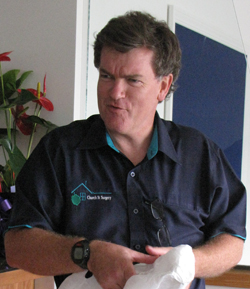Rural round-up : A look at telehealth

 Dr Jo Scott-Jones of New Zealand (left) and Dr Kate Dawson of Scotland (NHS) (photo at right) write about telehealth.
Dr Jo Scott-Jones of New Zealand (left) and Dr Kate Dawson of Scotland (NHS) (photo at right) write about telehealth.
Following the lead of the USA and Australia three years ago we developed a Rural Health Alliance in New Zealand, bringing together 40 different organisations that have an interest in the health and wellbeing of rural communities.
Our organisation includes professional colleges of health professionals, local authorities, industry groups, community organisations and “friends” it exists was to create a platform for member organisations to develop relationships that allow them to maximise the impact of their own agendas and to share common ground.
Our recent #Ruralfest16 was created by the energy and willingness of the participants to reach that common ground. Over an intensive workshop period we identified the issues we feel would have most impact on the health and wellbeing of rural communities and we saw the effectiveness of our unified voice when we took our five key initiatives into our national parliament.
Along with the importance of infrastructure to support rural health services, a focus on training a workforce focussed on rural communities, the common areas of concern we all share are those of promoting research and reporting of rural health outcomes, rural mental health issues and connectivity.
We all recognise access as the rural issue and internationally, good telecommunications infrastructure is seen as vital to support access to health services as a discussion of our “google group” revealed:
- In Alaska, a community-led health service using telecommunications supports health care assistants trained to work in general, mental health and dental health to provide basic services to settlements, sometimes smaller than 20 households.
- In the Iquitos area of the Amazon basin in Peru, the Mama River project provides mobile phones with solar chargers to support traditional birth attendants to improve maternity care in their villages.
- In Kenya, tribal and nomadic people are using mobile phones to access remote consultations
- In Rwanda a target of 95% population coverage for 4G means that a new generation of doctors are being trained to work in remote and rural parts of the country. The medical school is using the communications infrastructure to deliver teaching and networking.
It is really striking to hear how many of these projects are using communication technology to deliver their projects. In Norbotten in northern Sweden, they have almost universal 4G coverage, and are testing out webcams for supporting overnight review in older people's homes if there is a concern, using iPads to allow older people to participate in case conferences. In Norway, they are trialling having iPads being used by community care staff to communicate with nurses and physiotherapists. One physio describes making and emailing out a video of a treatment plan with a patient after hip surgery, so carers are able to view the video to ensure that they were supporting the exercises to be done correctly at home.
In countries where healthcare technology is working well, there has been commitment at a political level to commission access to good quality 4G, broadband and workplace WiFi. Health services are supported to make best use of the network, and best practice is researched and spread to new areas. In other countries where old technology infrastructure was not developed, such as Rwanda and Kenya - whole health care models have been designed from scratch using mobile phone technology and these “under developed” countries are quickly overtaking places like New Zealand and Scotland.
We are going to face some really big healthcare challenges as our very elderly population increases and young people move away from rural areas for better jobs and higher education. Older people have multi morbidities, and frail people are often unable to travel or drive because of their health conditions, rural public transport is poor and access to increasingly centralised services is difficult.
All of these stories have, at their heart, great teams and good communication technology. We have a responsibility to ensure that we use the available technology as well as we possibly can, design our services and networks around what we have, and support healthcare staff so that they can get the best out of what is available, but this is not just about doctors and nurses, ambulances and trauma cases, this is about communities.
As “five star” GPs we have a responsibility to advocate for our communities and get together with others who share our interests in the health and wellbeing of rural people and keep asking for high quality rural connectivity.